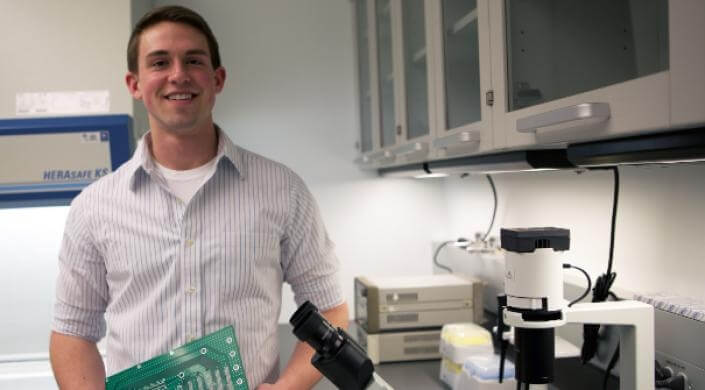News
Graduate student Keith Krenek develops biomedical research tools that allow scientists to study electrogenic cells. (Photo by Adam Zewe/SEAS Communications.)
Graduate student Keith Krenek has been selected by Analog Devices (ADI) to receive the Outstanding Student Designer Award.
The award, presented annually by ADI since 1997, recognizes excellence in system-level integrated circuit architectures or in analog, mixed-signal, or digital integrated circuit design. Krenek was nominated by advisor Donhee Ham, Gordon McKay Professor of Electrical Engineering and Applied Physics, for his academic achievements and potential for making significant contributions to industry. Krenek received the award during the 2016 International Solid-State Circuits Conference.
“I am very blessed to receive this honor,” Krenek said. “I put a lot of hard work into everything I do, and I greatly appreciate being recognized for my efforts.”
Krenek, who completed B.S. and M.S. degrees in electrical engineering at Texas A&M University, is pursuing a Ph.D. in applied physics at the Harvard John A. Paulson School of Engineering and Applied Sciences. For his doctoral work, Krenek develops biomedical research tools that allow scientists to study electrogenic cells—cells that are related to the production of electrical activity within the human body, such as heart cells or neurons.
The tiny CMOS chips Krenek works on with colleagues in Ham’s lab and the lab of Hongkun Park, Professor of Chemistry and Chemical Biology and of Physics, measure electrophysiological signals, with applications in fundamental neurobiology, brain-machine interfaces, and drug screening.
“Like many other people, I really hope my work will change the world. I chose engineering because I thought it would give me an opportunity to do really big things, to help people I’ve never met,” Krenek said. “It’s humbling and encouraging that my work could have such far-reaching impacts.”
As part of his research, Krenek packages “lab-on-a-chip” (LOC) systems, which miniaturize and automate highly technical laboratory processes, like mixing chemicals or culturing cells. LOC devices could be particularly beneficial in developing countries where many impoverished individuals are unable to afford diagnostic tests due to the expense of required laboratory equipment, explained Krenek.
He looks forward to continuing to develop this platform, which could help researchers learn more about the brain and treat diseases like Parkinson’s and Alzheimer’s.
Cutting-edge science delivered direct to your inbox.
Join the Harvard SEAS mailing list.
Press Contact
Adam Zewe | 617-496-5878 | azewe@seas.harvard.edu
